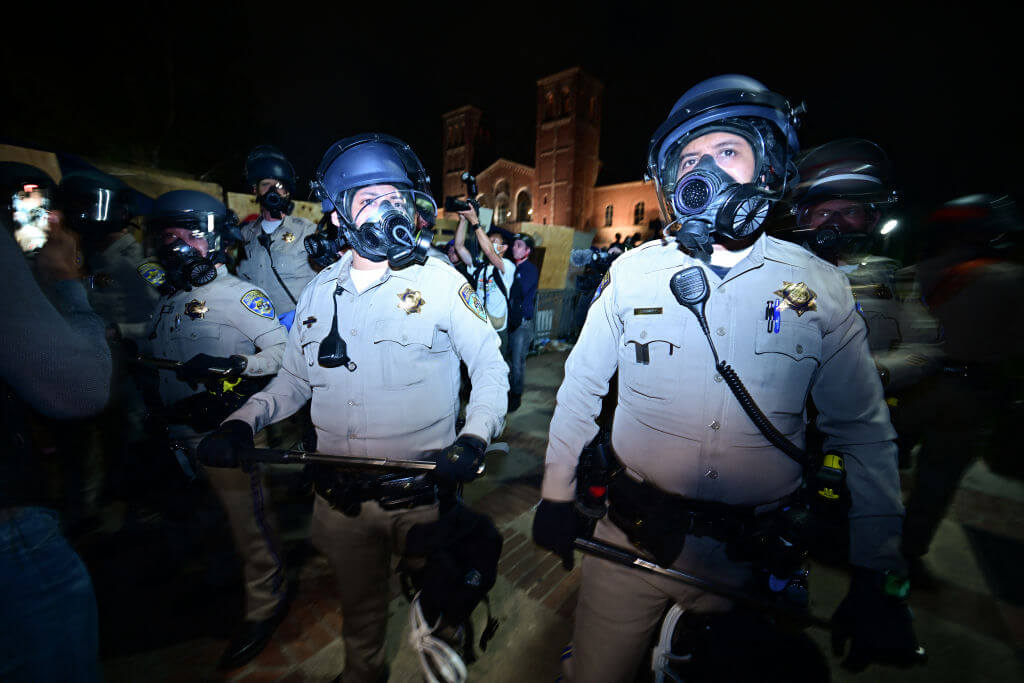‘Like a scene out of a horror movie’: Violence erupts at UCLA as pro-Israel group tries to dismantle encampment
Pro-Israel protesters hurled traffic cones and other projectiles at the pro-Palestinian encampment

Police officers stand guard after clashes erupted on the campus of the University of California, Los Angeles, on May 1. Photo by Getty Images
LOS ANGELES — A quiet weeknight at UCLA descended into mayhem after hundreds of pro-Israel protesters descended on the campus and began trying to dismantle a pro-Palestinian encampment.
Violence raged outside the encampment for nearly three hours — from around 11 p.m. Tuesday to a little before 2 a.m. Wednesday — before police officers arrived at the scene and began dispersing them.
Some of the violence appeared instigated by a pro-Israel contingent, according to eyewitness accounts as well as footage of the scene broadcast on the news. Wearing black masks or balaclavas to cover their faces, they threw a variety of projectiles — traffic cones, liquid infused with pepper spray, poles and at least one firework — at and over the makeshift plywood-and-steel fence separating the encampment from the rest of the quadrangle outside the school’s Royce Hall.
The encampment withstood the assaults and was still intact at 4 a.m., by which time only a few dozen pro-Israel protesters — pushed hundreds of feet away from the encampment by law enforcement officers — remained. But a loudspeaker playing Israeli children’s music ensured that the encampment continued to feel their presence.
The scenes marked the most violent confrontations between pro-Palestinian and pro-Israel protesters in the six months since the Gaza war began. It left pro-Palestinian protesters wondering why law enforcement had allowed hours to pass before intervening.
UCLA 🚨 2 : 22 AM - Violence continues as LAPD is on scene but not responding to the continued violence. pic.twitter.com/ec32unDF5p
— Anthony Cabassa (@AnthonyCabassa_) May 1, 2024
“It was like a scene out of a horror movie,” Kaia Shah, a postgraduate researcher who is a media liaison for the encampment, told a local reporter after the mayhem died down. “We got viciously attacked for hours and hours.”
Shah said she did not have a count of people injured or an estimate of how many students were in the encampment. But she said some had been evacuated to the hospital.
She said some of the assailants appeared to be teenage boys — and not UCLA students — and emphasized that the encampment had done nothing to provoke them into violence.
Unlike other schools where encampments have sprung up at universities in the last two weeks, UCLA has taken a largely hands-off approach since Thursday, when students set up a couple dozen tents in front of Royce Hall with a list of demands that included the university’s divestment from Israel.
But the school’s chancellor, Gene Block, said Tuesday that the encampment was “unlawful” and that students who refused to leave would face suspension or expulsion.
The Jewish Federation Los Angeles issued a statement that read, in part, “The abhorrent actions of a few counterprotesters last night do not represent the Jewish community or our values. We believe in peaceful, civic discourse.”
An email to UCLA Hillel was not returned before publication.
Israel supporters have been rallying outside the UCLA encampment for nearly as long as it has existed. The public university’s Jewish alumni are legion, and its campus is in the heart of the city’s Westside, home to hundreds of thousands of Jews.
A few pro-Israel protesters have showed up nightly to harass the encampment by playing loud music or talking into a bullhorn outside. One such activist, who goes by “TheFlagGuy,” posted video of his efforts online.
A counterprotest organized by the Israeli American Council, which drew hundreds to the quad Sunday, was the only official demonstration. A projector screen was set up to display the faces of the hostages taken on Oct. 7, and loud Israeli pop music played from speakers for hours.
That day’s scene, too, turned violent, but only sporadically — a punch thrown here and there. Tuesday night was a different story: a melee described by one local broadcast reporter as “anarchy.”
Shah said throngs of pro-Israel protesters showed up at the encampment and began trying to take down its wall. When encampment security tried to stop them, they were hit with what was either pepper spray or bear spray, she said.
What I witnessed tonight is like nothing I have ever seen in my life. Complete lawlessness, anarchy, body’s dragged away after scuffles, blood, mace after mace after mace spray, fires, explosives, the list goes on. The school and the city failed the students tonight. Insanity. pic.twitter.com/XZtshC9fN2
— Anthony Cabassa (@AnthonyCabassa_) May 1, 2024
Soon after, Shah said, the protesters began launching objects into the encampment. She said she believed four fireworks in total had been thrown over the course of the night and that a few students inside the encampment had suffered burns when they exploded.
“I didn’t think it would escalate to this level,” Shah, 23, said, adding that she had called 911 but was unable to reach a dispatcher.
As local and national broadcast helicopters circled overhead, their reporters wondered aloud why law enforcement was nowhere to be found.
Adding to the confusion were statements from the university and from Los Angeles Mayor Karen Bass indicating that police were on site.
Shah said she had seen one police car — she was unsure which agency — show up only to turn away. Campus security had been present at one point, too, she said, only to leave the scene when violence escalated.
This is a developing story.





















